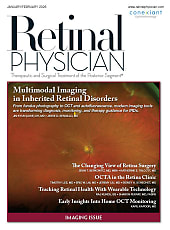Technological advances are everywhere. When I browse the internet, read a newspaper, or attend a medical conference, inevitably there are numerous presentations, articles, or references to the future of technology and artificial intelligence (AI) in health care. The field of retina continues to be on the cutting-edge of medicine. From drug delivery innovation and gene therapy to imaging and surgical advancements, retina is technology driven. Will advancements in technology and AI extend their reach and eventually take over ophthalmology and the field of retina?
Dr. Ted James at Harvard Medical School discusses how physicians play an important role in shaping technology innovation in health care.1 Specifically, he reinforces the key message that physicians’ clinical insights are crucial to ensure technology solutions are relevant, practical, and patient-centric. In fact, physicians can play a critical role in the health tech landscape by contributing to clinical needs assessment, product beta-testing, advisory boards, or even becoming chief medical officers (CMO) in industry.
Many of our retina colleagues are involved in the ophthalmology tech landscape. We know friends who have been key advisors to biotech companies, playing important roles in drug development and clinical trials. Others have designed surgical instruments or laser devices to create better tools for treating our patients. In addition, retina specialists are becoming leaders in industry with many taking leadership roles as CMOs, chief executive officers, chief scientific officers, and many other positions. It is wonderful to see how retina specialists are contributing to the advancement of ophthalmology and medical care.
In this issue of Retinal Physician, John B. Miller, MD, and colleagues review heads-up surgical display systems. These 3-dimensional visualization systems replace the traditional binocular viewing system through microscope oculars. The authors succinctly discuss the technological advances of the heads-up systems and the challenges of integrating these devices into our operating rooms. These topics reflect how ophthalmology, retina, and technology can integrate together for future benefit. In addition, Harry W. Flynn, MD, and colleagues share an update on endophthalmitis management. Furthermore, Ingrid U. Scott, MD, MPH, and colleagues review cell therapy and its potential in retina.
It is wonderful to have this collaborative effort to help busy retina specialists keep up to date on important topics that impact their patients. Thank you for taking the time to read Retinal Physician—we appreciate your partnership. RP
References
1. James T. Physicians at the forefront of health care technology innovation. Harvard Medical School. September 22, 2023. Accessed April 17, 2025. https://postgraduateeducation.hms.harvard.edu/trends-medicine/physicians-forefront-health-care-technology-innovation









